Five talking points from stage 11 of the Tour de France 2020
More on the Sagan and Van Aert drama, late attacks and a deserved Ewan win - these are the big moments from the day
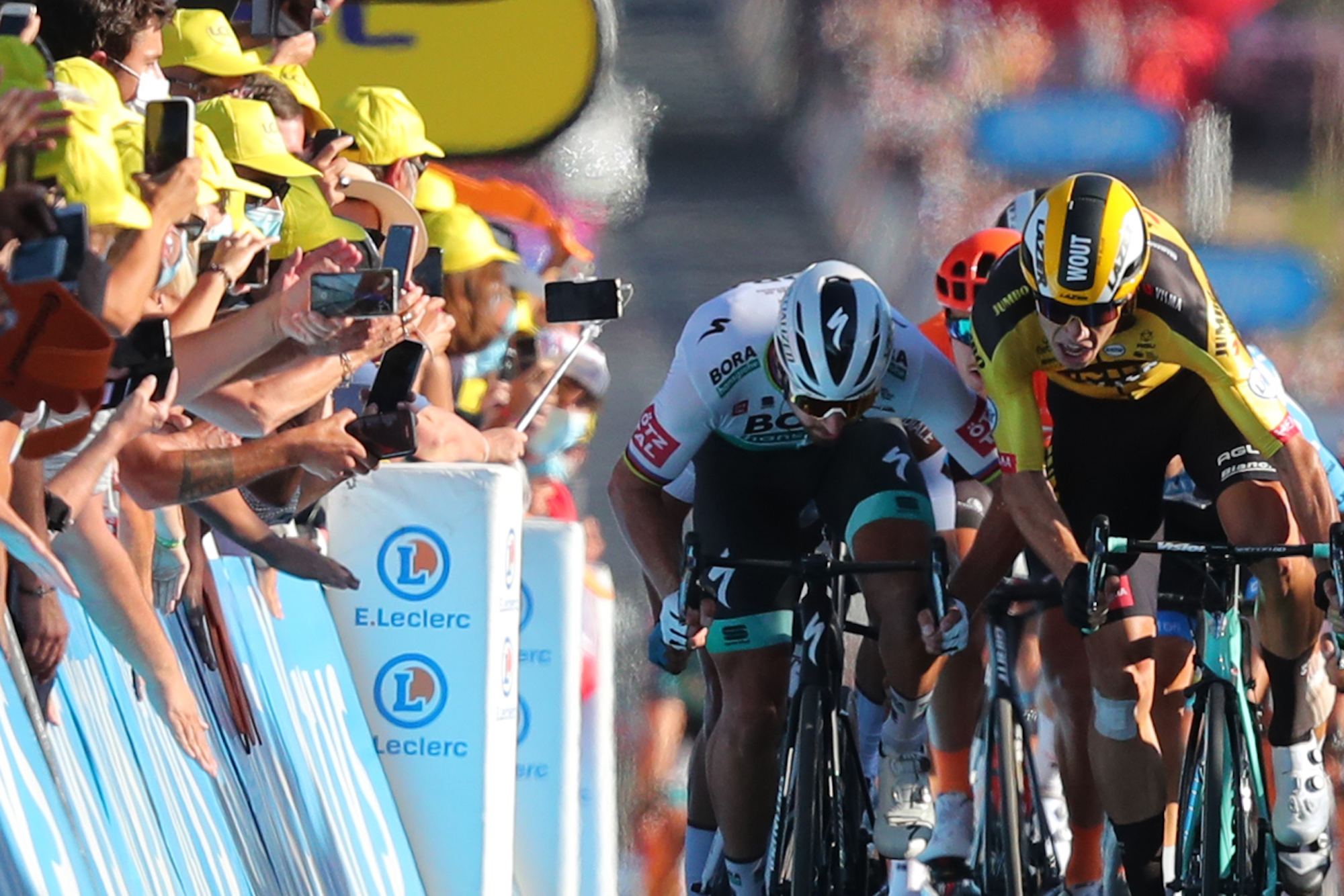
Relegation plunges Sagan’s green jersey defence into doubt
There was drama even after the riders had crossed the line today, as Peter Sagan (Bora-Hansgrohe) was relegated for dangerous sprinting.
Although he does not lose a stage win — he was edged into second at the line by winner Caleb Ewan (Lotto-Soudal) — he might just have lost any chance of winning the green jersey ahead of Sam Bennett (Deceuninck - Quick-Step). As a result of Bennett finishing third, and Sagan losing both the points he would have gained for finishing second at the finish as well as those he picked up at the intermediate sprint earlier in the day, the defending champion now finds himself a huge 68 points adrift from the Irishman.
It’s easy to see why the commissaires made the decision. In attempting to squeeze between the barriers and Wout van Aert, Sagan leaned into the Belgian, much to his indignation.
The Slovak is renowned for his extraordinary bike-handling skills, and so manoeuvres that might seem reckless to others he might interpret as safe, given his ability to stay upright. But the gap he was attempting to squeeze through was extremely narrow, and it’s hard to interpret his sprint as anything other than reckless.
Sagan has history in incurring the wrath of the commissaires, having been thrown off the race altogether in 2017 for causing a crash. That was the only appearance at the Tour de France that did not end in a points classification victory — might another relegation cost him once more? He has some serious work to do in the upcoming hilly stages if he’s to have any chance of defending his title.
Caleb Ewan claims a second stage victory
The latest race content, interviews, features, reviews and expert buying guides, direct to your inbox!
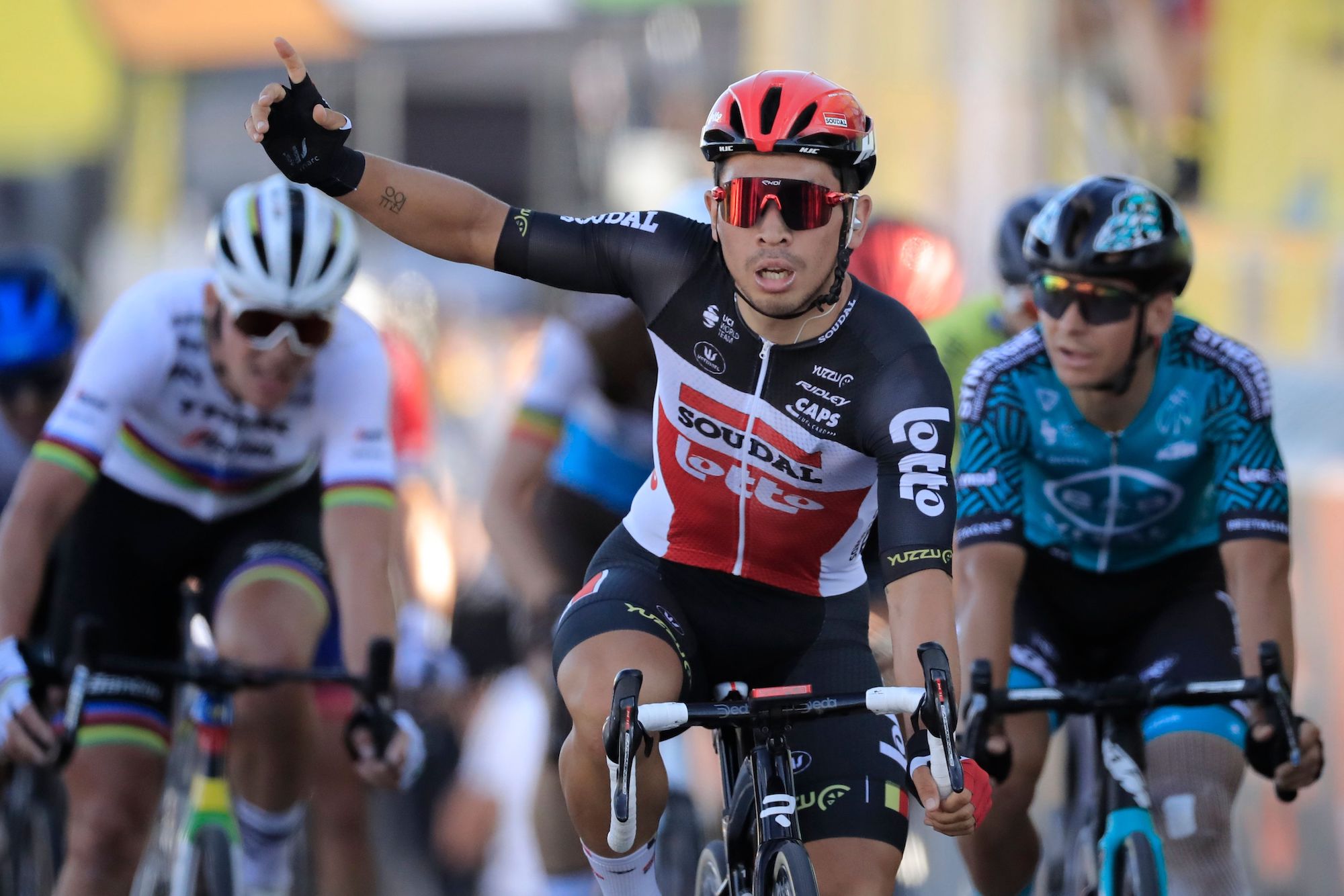
Caleb Ewan claimed his second stage of this year’s Tour de France, in what was a photographer’s dream of a finish.
Ewan, Sam Bennett (Deceuninck - Quick-Step), Wout van Aert (Jumbo-Visma) and Peter Sagan (Bora-Hansgrohe) all simultaneously lunged to the line side-by-side, forming an aesthetically-pleasing, colourful line in their respective red, green, yellow and white jerseys.
It was an image that reflected just how evenly matched the sprinters have been this year. With this victory Ewan joins Wout van Aert on two wins, and pulls ahead of Sam Bennett on one, while Alexander Kristoff’s (UAE Team Emirates) triumph on the opening day means the six bunch finishes have been shared around between four different riders.
However, if the pattern of last year’s Tour is anything to go by, this might be the moment when Ewan becomes the race’s dominant sprinter. That year, the Australian also won stage eleven, and from that point went unbeaten in the sprint finishes for the remainder of the race, with two more victories (in Nimes and on the Champs Élysées).
It’ll be a while until he gets another chance — stage nineteen seems to be the next, and only, opportunity before Paris — but the signs are that Ewan could be in for another haul.
Late attacks make for an unusual finish
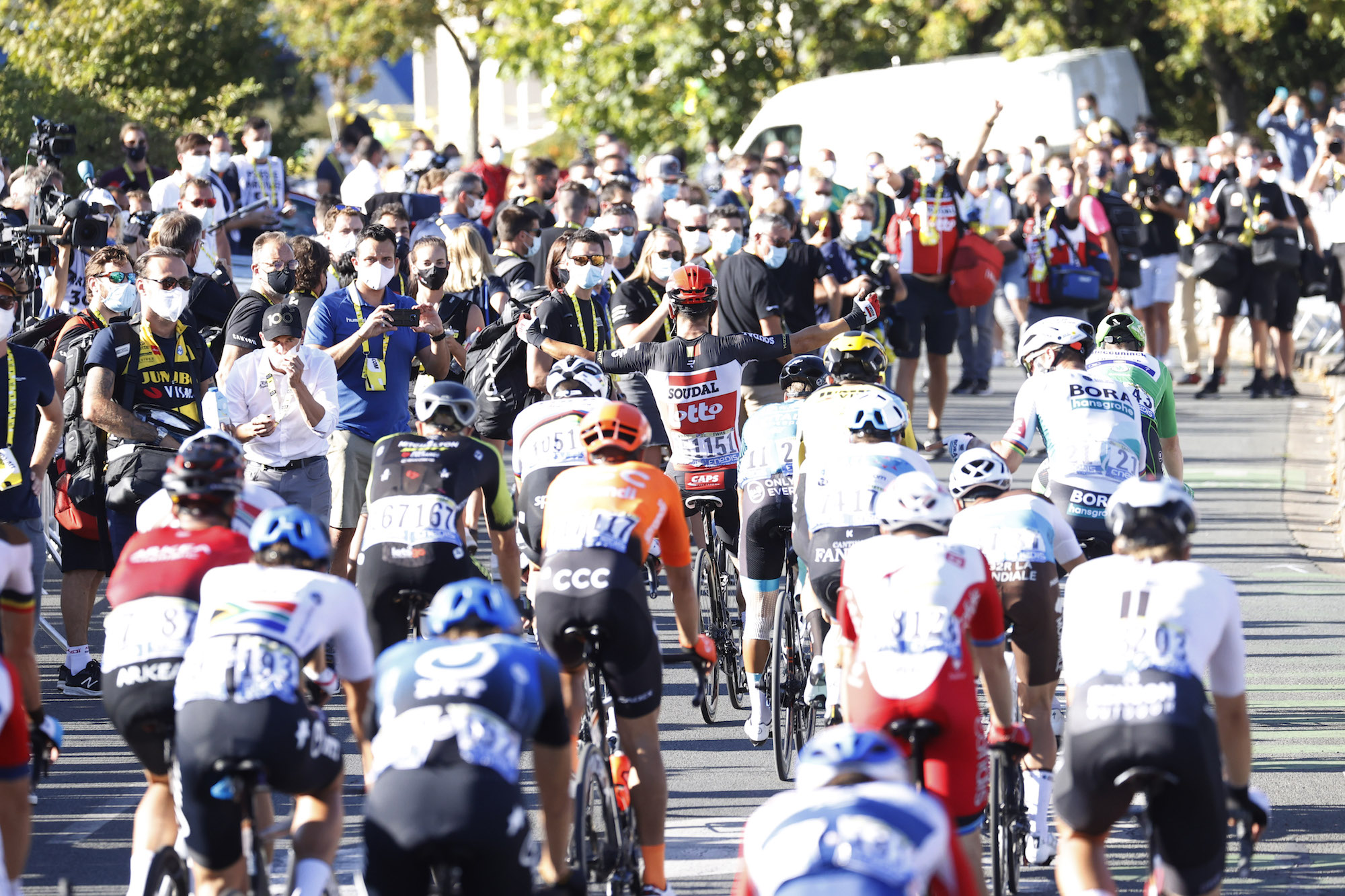
A formulaic day in which little happened for most of the stage almost took an unusual twist inside the final six kilometres, when Lukas Pöstlberger made an attack.
It was a surprise move given his role as one of Sagan’s key-lead out men, but one that was, according to the Pöstlberger at the finish, pre-planned, as an attempt to make the finish “more difficult” for Deceuninck - Quick-step and the other sprinters’ teams.
The attack even looked like potentially being a race-winning one, when the Austrian was joined by two of Sam Bennett’s lead-out riders, Bob Jungels and Kasper Asgreen. As three powerful rouleurs, it was no easy task for the peloton to bring them back, and required committed efforts from the domestiques of Cofidis, Lotto-Soudal and NTT Pro Cycling to make the catch, 2.2km from the line.
Though the bunch sprint was back on, with so many of the usual lead-out men used up in this chase, it was a messy one. Wildcard team B&B Hotels-Vital Concept found themselves in the unusual position of leading out the sprint, for their leader Bryan Coquard, but didn’t have the fire-power to string out the bunch and control proceedings
Wout van Aert chose to make his move early by launching his sprint over 300 metres from the finish. It would have been an amazing win to maintain his efforts for such a long sprint, but instead had the effect of restoring some order to events, as he provided a lead-out that the other sprinters were able to use to sit in the slipstream of.
An early breakaway is shut down
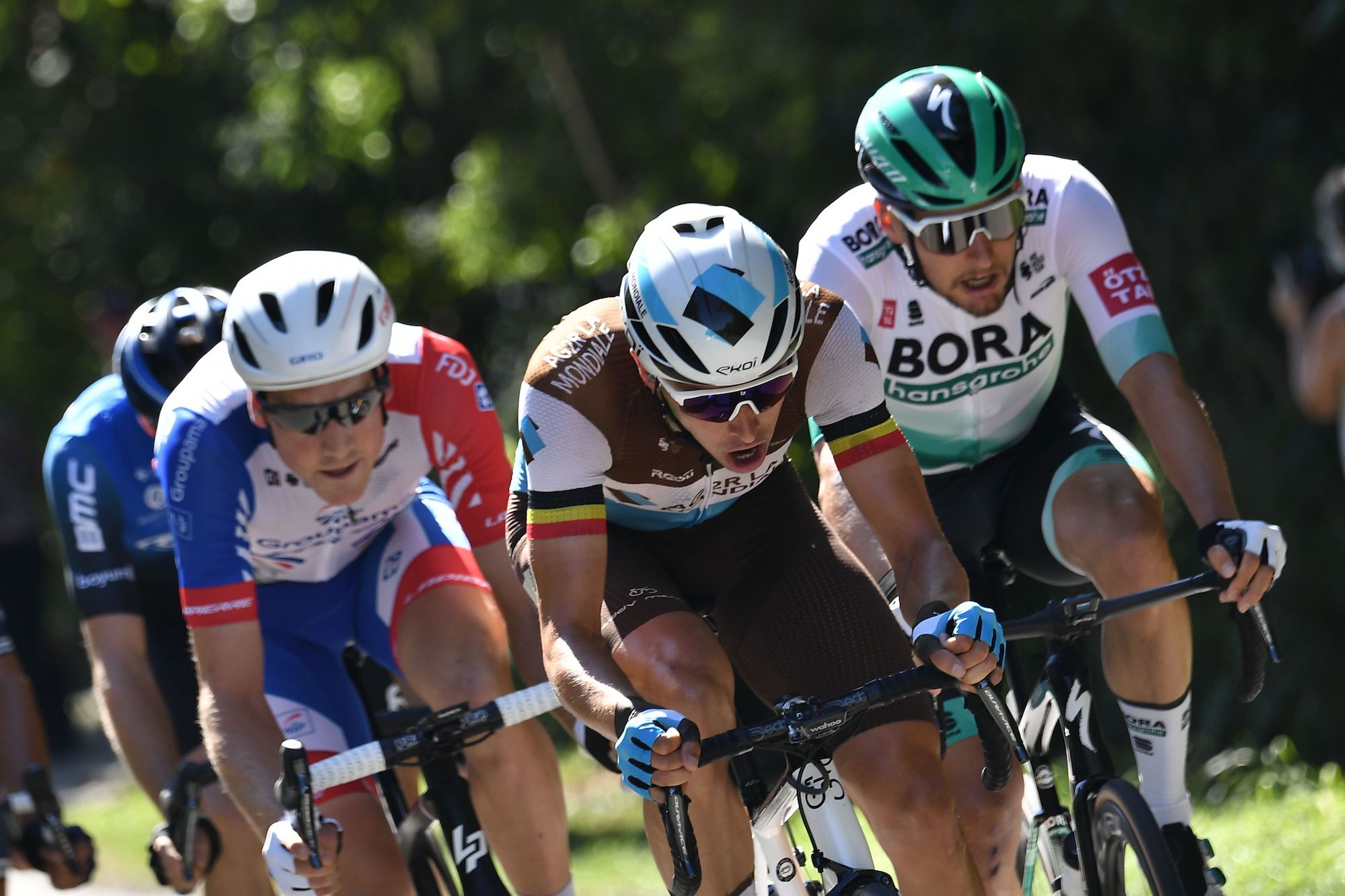
Stage 11 continued one of the most striking trends of flat stages at the Tour this year — the lack of riders getting into breakaways at the start of stages.
Matthieu Ladagnous (Groupama-FDJ) followed in the footsteps of Jérôme Cousin (Total Direct Energie) by spending most of the day out in front alone, attacking at the beginning with no-one accompanying him, and eventually being caught three hours later, 43km from the finish.
That was at least more activity than stage five, which did not feature a single breakaway.
This time, there was at least a committed effort from a handful of riders to get up the road. Shortly after Ladagnous had escaped up the road, a counter-attack of six riders went clear, featuring some pretty high calibre classics specialists like Oliver Naesen (Ag2r La Mondiale) and Jasper Stuyven (Trek-Segafredo).
The response from the peloton to this break might help explain why there has been so few attacks this year. Despite only being half a dozen riders big, Deceuninck - Quick-Step deemed it too big a threat to their hopes of the stage finishing in a bunch sprint, and immediately set about shutting it down.
When even a break like this, which featured no threats to the GC, is not allowed to go clear, is it any wonder that so few riders have been willing to try and get into breakaways this year?
A quiet stage, but with two abandonments
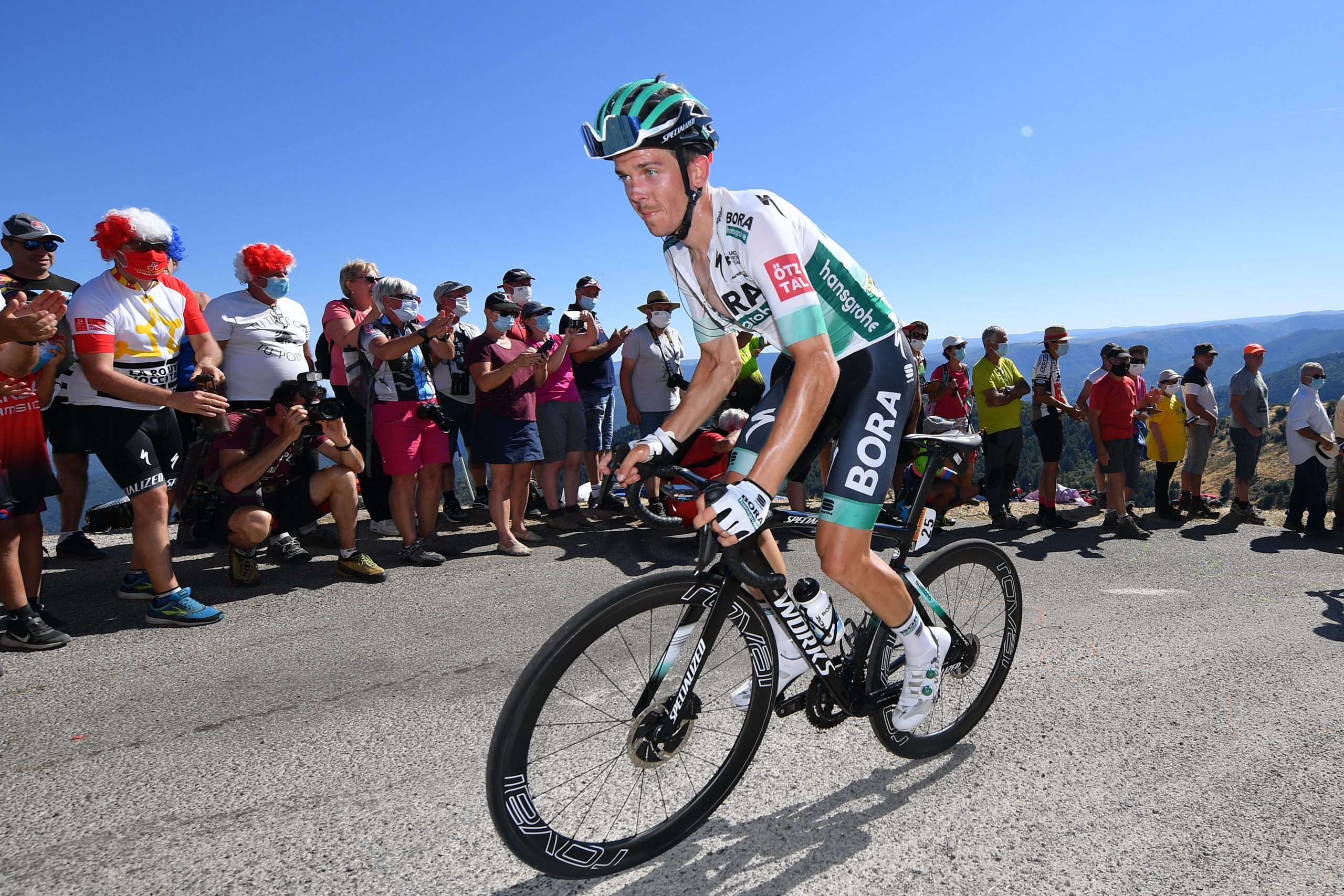
It might have been a largely innocuous day for most, but, for two riders, stage eleven was the end of the road.
It was clear something was up with Gregor Muhlberger early in the stage when the Bora-Hansgrohe rider was spotted hovering just off the back of the peloton. Despite the slow pace, Muhlberger appeared to be seriously struggling to stay in the group.
After continuing like this for several kilometres, the Austrian eventually stopped altogether, abandoning the race in considerable discomfort, with reports that illness was the reason.
Later, Jon Izagirre (Astana) was one of a few riders to go down in a crash. Though not caught by the TV cameras, it appeared to be a serious incident, as the Spaniard sat for a long time barely moving, and being tested for concussion.
He was taken to hospital, leaving Miguel Ángel López without one of his key domestiques for the upcoming mountains.
>>> Wout van Aert tried to speak to Peter Sagan after stage 10 ‘but the only thing that came back was strong words’
The fortunes of both these riders highlighted the challenges of a three-week race. Even on a day where most are able to rest and preserve energy, there is always the threat that a either illness or a sudden crash can abruptly see your whole race come to an end.
Stephen Puddicombe is a freelance journalist for Cycling Weekly, who regularly contributes to our World Tour racing coverage with race reports, news stories, interviews and features. Outside of cycling, he also enjoys writing about film and TV - but you won't find much of that content embedded into his CW articles.